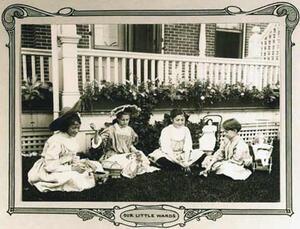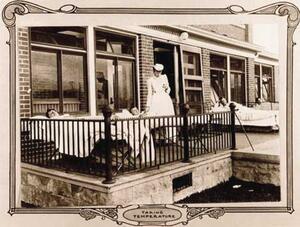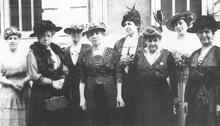Seraphine Eppstein Pisko
A philanthropic woman committed to Jewish and general charitable work, Seraphine Pisko ran the National Jewish Hospital in Denver, Colorado, for nearly thirty years. Here, several male patients are lying on the hospital porch experiencing "open-air treatment." A uniformed nurse takes one patient's temperature and pulse.
Institution: Beck Archives, Penrose Library and Center for Judaic Studies, University of Denver
As executive secretary and vice president of the National Jewish Hospital for Consumptives in Denver, Seraphine Eppstein Pisko was one of the first women to lead a national Jewish institution. She served as president of the Hebrew Ladies Benevolent Society and represented the Women’s Club of Denver at the 1899 National Conference of Charities and Corrections in Cincinnati. She then took a position as field secretary for the National Jewish Hospital, becoming secretary in 1911 and eventually rising to vice president. She also served as president of the local chapter of the National Council of Jewish Women, organizing a local settlement house and kindergarten, and later served as national director of NCJW. After retiring in 1938, Pisko continued as an honorary officer until her death.
Like so many middle-class Jewish women at the turn of the century, Seraphine Eppstein Pisko used her longtime experience in volunteer charitable work and her organizational talents to move into the realm of the professional workplace. In 1911, Pisko was appointed secretary of National Jewish Hospital (NJH) for Consumptives in Denver. She was later appointed executive secretary as well as vice president and remained in control of day-to-day affairs at the hospital until her retirement twenty-seven years later in 1938. National Jewish had opened in 1899 as a nonsectarian sanatorium for indigent tuberculosis victims, although the majority of patients in the early years were Jewish. At the administrative helm of NJH, Pisko was probably the first woman in the United States to assume the position of chief executive of a national Jewish institution.

In 1911, Seraphine Pisko was appointed to a position at the National Jewish Hospital for Consumptives in Denver, Colorado, and went on to become its director, probably the first woman in the United States to become chief executive of a national Jewish institution. In this photo, four young female patients play with their toys on the hospital lawn.
Institution: Beck Archives, Penrose Library and Center for Judaic Studies, University of Denver
Early Life
Seraphine Eppstein Pisko was born in St. Joseph, Missouri, on January 1, 1861, to Max and Bertha Eppstein, and moved to Denver in 1875 with her parents when she was fourteen years old. She was the eldest of six, followed by her sisters Julia and Carrie, her brother Arthur, and twin sisters Lillian and Helen. Seraphine attended local Denver public schools.
In 1878, at age seventeen, she married prominent Jewish Denver businessman Edward Pisko, who was eighteen years older and headed a thriving liquor business. An Austrian immigrant who had been elected to the Colorado State Legislature in 1876 and had served as president of Denver’s B’nai B’rith in 1877, Pisko was a leader in Denver’s growing Jewish community.
After they were married, the couple resided in New York City for a period, but Seraphine Pisko returned to Denver as a widow after the untimely death of her husband just a few years after they were married. Back in Denver, she made her home with her sister and brother-in-law, Lillian, and Ernest Morris, who were active members of Denver’s Jewish community.
Career
Pisko then embarked on a renewed lifelong commitment to local Jewish and general charitable work. She served as president of the Hebrew Ladies Benevolent Society in Denver, which was renamed the Jewish Relief Society in 1901, and attended the first national Conference of Jewish Charities as a delegate. Prominent in Denver club work as well, she represented the Women’s Club of Denver at the 1899 National Conference of Charities and Corrections in Cincinnati. After retiring as president of the Jewish Relief Society, she accepted the paid position of the first field secretary (traveling fund-raiser) for National Jewish Hospital, which eventually evolved into her appointment as secretary.

A philanthropic woman committed to Jewish and general charitable work, Seraphine Pisko ran the National Jewish Hospital in Denver, Colorado, for nearly thirty years. Here, several male patients are lying on the hospital porch experiencing "open-air treatment." A uniformed nurse takes one patient's temperature and pulse.
Institution: Beck Archives, Penrose Library and Center for Judaic Studies, University of Denver
Pisko also served as president of the local chapter of the National Council of Jewish Women, where she helped organize the Denver Jewish Settlement House and free kindergarten to benefit Eastern European Jewish immigrants living on Denver’s west side. Although of German Jewish descent and a staunch Reform Jew, Pisko was frequently sensitive to the religious and cultural needs of the Eastern European immigrants and helped introduce a Term used for ritually untainted food according to the laws of Kashrut (Jewish dietary laws).kosher kitchen at NJH in 1923. A cultured woman of cosmopolitan sensibilities, she was well known in many American Jewish communities, and she became a national director of the National Council of Jewish Women as well.
Later Life
Seraphine Eppstein Pisko was an exceptionally capable woman, who earned a national reputation for her organizational expertise. Her experience in managing local Jewish charitable organizations made her particularly suitable to embark on a professional career in hospital fund-raising and administration. Her contacts with Jewish communities throughout the country also served her well in developing national support for the growing sanatorium.
In 1925, National Jewish Hospital honored her by renaming the Women’s Pavilion the Seraphine Pisko Pavilion. At the dedication, Pisko was described as a woman of “extraordinary ability,” “remarkable powers of organization,” “splendid judgment,” “fine tact,” and “all-embracing sympathy.”
Failing health forced Pisko to retire in 1938, but she continued as an honorary officer until her death on July 27, 1942, at age eighty-one. Seraphine Eppstein Pisko served as a role model for generations of Jewish women that followed, combining a clear professional vision with unswerving commitment to the Jewish community.
AJYB 7 (1905–1906): 94, 45:391.
Breck, Allen. A Centennial History of the Jews of Colorado (1960).
Fitzharris, Mary Ann. A Place to Heal: The History of National Jewish Center for Immunology and Respiratory Medicine (1989).
Friedenthal, S. “The Story of the Jews of Denver.” The Reform Advocate (1908).
National Jewish Hospital Collection. Beck Archives of Rocky Mountain Jewish History, University of Denver.
Obituary. NYTimes, July 31, 1942, 15:4.
Toll, William. “Gender and the Origins of Philanthropic Professionalism: Seraphine Pisko at the National Jewish Hospital.” Rocky Mountain Jewish Historical Notes 11, nos. 1 and 2 (Winter/Spring 1991).
Uchill, Ida. Pioneers, Peddlers, and Tsadikim (1959).
UJE.
WWIAJ (1928, 1938).



